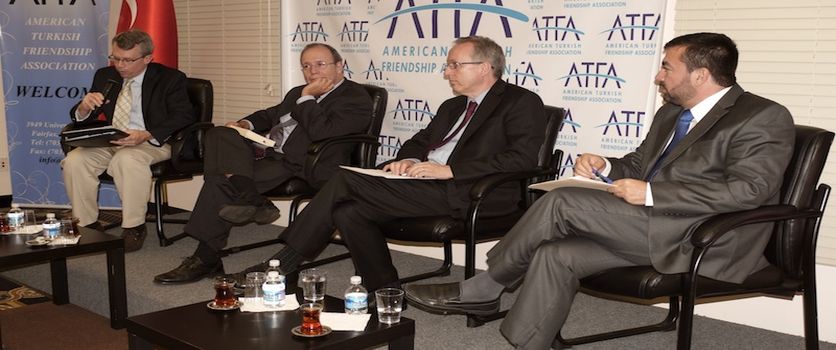Marc Gopin, Ian S. Markham and Imam Abdullah Antepli discussed the varying perceptions of a “just war” in the 3 Abrahamic religions.
The discussion was addressed by the 3 scholars in a chronological order, reflecting the evolution of the concept. In the end, many similarities were found regarding how the 3 religions conceptualized the legitimate use of violence.
Event Summary:
Marc Gopin, the director of the Center for World Religions, focused on the Jewish perspective of just war. He began by noting that just war is a highly developed intellectual subject, and briefly explained some of the conflicting viewpoints expressed in the different biblical books including the book of Genesis, Deuteronomy, and Samuel. He highlighted the controversies by quoting the commands in the book of Deuteronomy to kill men, women, and children in the Canaanite nations, but on the other end of the spectrum, he recalled that there are many statements against war in the books of the Prophets. Judaism, in its true nature, is rabbinic Judaism which is formulated in its details and its legal structures by rabbis. Gopin also referenced the different types of wars: obligatory war and permissible war. Old theories of just war focused on kings and authorities that were not elected, where people had absolutely no voice. He concluded that even though the theories of just war in Judaism have very rich ethics of violence and nonviolence, ancient just war theory is not relevant to today because most conditions to declare war are ancient and not present in the modern world.
To elucidate just war theories in Christianity Ian S. Markham began by emphasizing the great challenge to talk about the tradition as a whole. Markham then focused on pacifism, the teaching of Jesus. He called attention to the fact that Jesus found the principle of an eye for an eye insufficient, although a good one. Additionally, Jesus claimed that in cases of violence one is to turn their cheek, that is, to go farther in peace than returning equal violence. Augustine of Hippo is one of the most significant figures to develop the tradition of just war. Later Markham revealed the two key conditions for just war; first the war needs to be established by an appropriate authority and second, the cause needs to be self-defense. The main goal of the restrictions or rather rules for just war is to promote peace. Just war principles could extend to action that needs to be taken to prevent the preventable and be legitimate. Sometimes the only way to prevent war and bring peace is to pause and to think about options other than war.
Imam Abdullah Antepli began his explanation by reminding the audience of a horrible event, 9/11. He underlined how the concept of war, violence, destruction, and terrorism is now used as a synonym for Muslims and Muslim theology. Antepli explained the 4 major Islams and how for each and every category there are different dynamics involved with just war. He described the first Islam as theology, second Islam as Muslims/people, third Islam as history and fourth Islam as a source of fear. Just war is discussed in detail and canonized in the Quran. He stressed that revenge is not the way to go and just like Gopin, he stated that most of this literature today is irrelevant because of the modern warfare and technology.
Marc Gopin is the Director of the Center for World Religions, Diplomacy and Conflict Resolution (CRDC), the James H. Laue Professor at the School for Conflict Analysis and Resolution at George Mason University and co-owner of MEJDI, a peace tourism business. Gopin has pioneered projects at CRDC in Afghanistan, Iran, Syria, Palestine, and Israel.
Ian S. Markham currently serves as Dean and President of Virginia Theological Seminary in Alexandria, Virginia and as Priest Associate at St. Paul’s Church in Alexandria. Prior to Dean Markham’s appointment in 2007, he served as Dean and Professor of Theology and Ethics at Harford Seminary in Connecticut, and as Visiting Professor of Globalization, Ethics, and Islam at Leeds Metropolitan University in the United Kingdom. Dean Markham’s awards include the Robertson Fellow 2006; Teape Lecturera in India 2004; Claggett Fellow attached to Washington National Cathedral in 2000; and Frank Woods Fellow at Trinity College, Melbourne in 1997. With degrees from London, Cambridge, and Exeter Universities he is the author and editor of numerous books including A Theology of Engagement; Truth and the Reality of God; Do Morals Matter; Understanding Christian Doctrine, and Liturgical Life Principles.
Imam Abdullah Antepli completed his basic training and education in his native Turkey. From 1996-2003 he worked on a variety of faith-based humanitarian and relief projects in Myanmar (Burma) and Malaysia with the Association of Social and Economic Solidarity with Pacific Countries. He is the founder and executive board member of the Muslim Chaplains Association and a member of the National Association of College and University Chaplains. From 2003 to 2005 he served as the first Muslim chaplain at Wesleyan University. He then moved to Hartford Seminary in Connecticut, where he was the associate director of the Islamic Chaplaincy Program & Interfaith Relations, as well as an adjunct faculty member.






